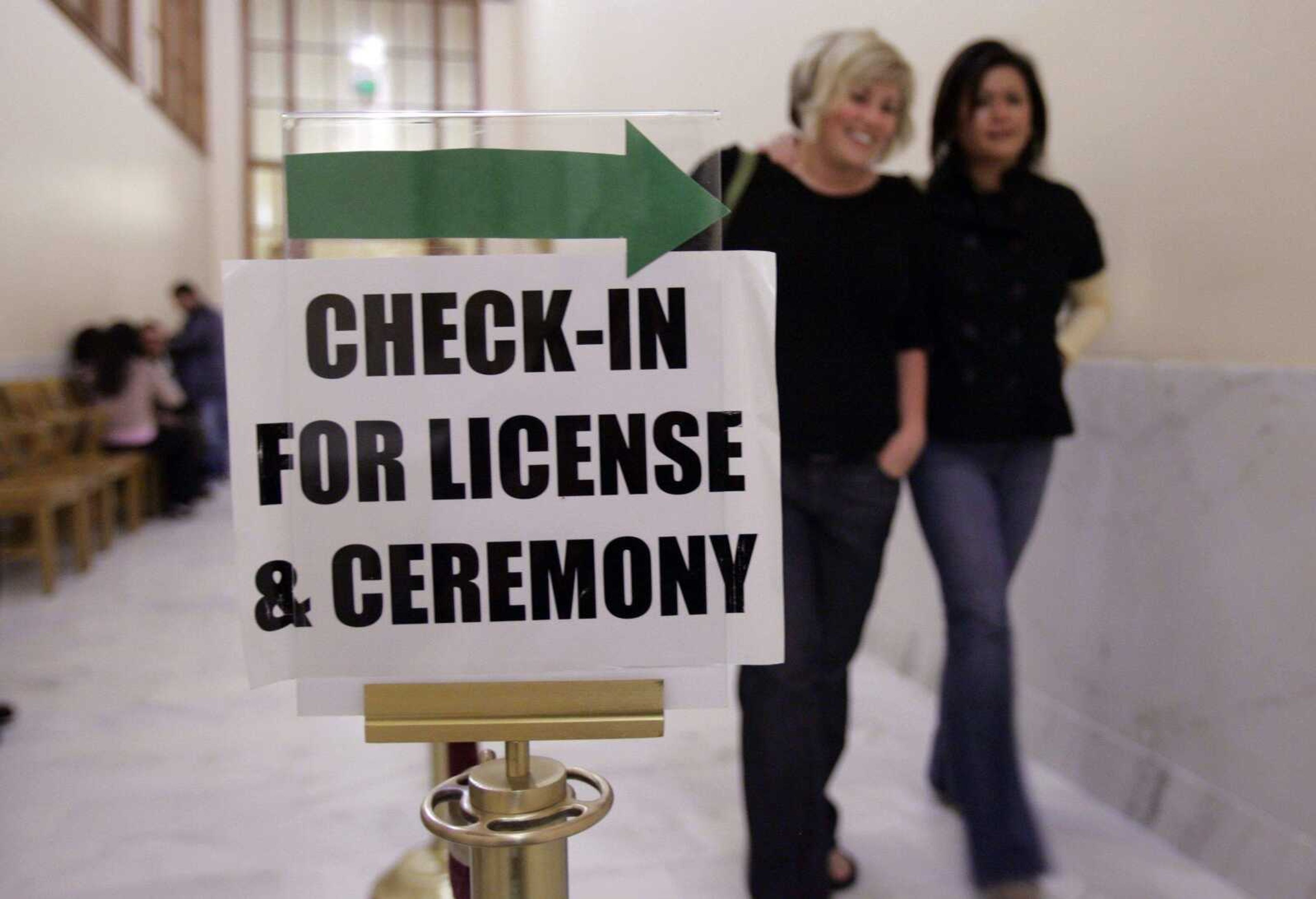Gay-rights activists challenge passage of marriage amendment in California
LOS ANGELES -- In a defeat for the gay-rights movement, California voters put a stop to gay marriage, creating uncertainty about the legal status of 18,000 same-sex couples who tied the knot during a four-month window of opportunity opened by the state's highest court...
LOS ANGELES -- In a defeat for the gay-rights movement, California voters put a stop to gay marriage, creating uncertainty about the legal status of 18,000 same-sex couples who tied the knot during a four-month window of opportunity opened by the state's highest court.
Passage of a constitutional amendment against gay marriage -- in a state often at the forefront of liberal social change -- elated religious conservatives who had little else to cheer about in Tuesday's elections. Gay activists were disappointed and began looking for battlegrounds elsewhere in the back-and-forth fight to allow gays to wed.
"There's something deeply wrong with putting the rights of a minority up to a majority vote," said Evan Wolfson, a gay-rights lawyer who heads a group called Freedom to Marry. "If this were being done to almost any other minority, people would see how un-American this is."
Legal skirmishing began immediately, with gay-rights groups challenging the newly passed ban in court Wednesday and vowing to resist any effort to invalidate the same-sex marriages that took place following the state Supreme Court decision in May.
The amendment, which passed with 52 percent of the vote, overrides that court ruling by defining marriage as the union of one man and one woman. Thirty states now have adopted such measures, but the California vote marks the first time a state took away gay marriage after it had been legalized.
Gay-marriage bans also passed Tuesday in Arizona and Florida, with 57 percent and 62 percent support, respectively, while Arkansas voters approved a measure aimed at gays that bars unmarried couples from serving as adoptive or foster parents.
Massachusetts and Connecticut are now the only states to allow same-sex marriage.
Even as the last votes were being counted in California, the American Civil Liberties Union and other opponents of the ban filed a challenge with the state Supreme Court. They contended that California's ballot cannot be used to undermine one group's access to rights enjoyed by other citizens.
The measure's passage casts a shadow of uncertainty over the marriages performed in the past four months. California Attorney General Jerry Brown has said existing gay marriages will remain valid, but other legal experts said challenges are likely.
Amid the uncertainty, some gay couples continued applying for marriage licenses Wednesday. They succeeded in some jurisdictions and not others.
Jake Rowe, 27, and James Eslick, 29, were in the midst of getting their marriage license at Sacramento City Hall when someone from the clerk's office stopped the wedding Wednesday morning.
"I'm thoroughly surprised," Rowe said. "I thought Californians had come to the point where they realized discrimination wasn't right."
Some newlyweds took a positive approach.
"I'm really OK," said Diana Correia of Berkeley, who married her partner of 18 years, Cynthia Correia, on Sunday in front of their two children and 80 relatives and friends. "I hope the marriage holds, but we are already married in our hearts, so nobody can take that away."
Proposition 8 became the focus of the most expensive social-issues campaign in U.S. history, with the rival sides raising a combined $74 million. Religious groups, including the Mormon church and the Roman Catholic Church, played pivotal roles in pushing for the ban.
"People believe in the institution of marriage," said Frank Schubert, co-manager of the Yes on 8 campaign. "It's one institution that crosses ethnic divides, that crosses partisan divides."
Exit polls revealed dramatic demographic gaps in the gay-marriage vote. While about six in 10 voters under 30 opposed the ban, about the same proportion of those 65 and older supported it. There were sharp racial discrepancies as well. Even as black voters overwhelmingly backed Barack Obama -- a gay-rights supporter -- in the presidential race, about seven in 10 of them voted against gay marriage, compared with about half of white voters.
Denise Fernandez, a 57-year-old black woman from Sacramento, said she voted for Obama and Proposition 8. "I believe a Christian is held accountable," she said.
Obama had a nuanced position on the issue, saying he opposes gay marriage while also speaking out against Proposition 8.
Rea Carey, executive director of the National Gay and Lesbian Task Force, did not directly criticize Obama, but said: "We'd hope for a day when candidates who are supportive of same-sex marriage are unafraid to clearly state that to the voters."
Gay-marriage proponents say New York, where the Democrats now control both the Legislature and the governor's office for the first time in 35 years, may be a promising battleground. New Jersey also is considered a gay-marriage prospect.
"We pick ourselves up and trudge on," said Kate Kendell, executive director of the National Center for Lesbian Rights. "There has been enormous movement in favor of full equality in eight short years. That is the direction this is heading, and if it's not today or it's not tomorrow, it will be soon."
------
EDITOR'S NOTE: Lisa Leff reported from Los Angeles and David Crary from New York.
Connect with the Southeast Missourian Newsroom:
For corrections to this story or other insights for the editor, click here. To submit a letter to the editor, click here. To learn about the Southeast Missourian’s AI Policy, click here.










